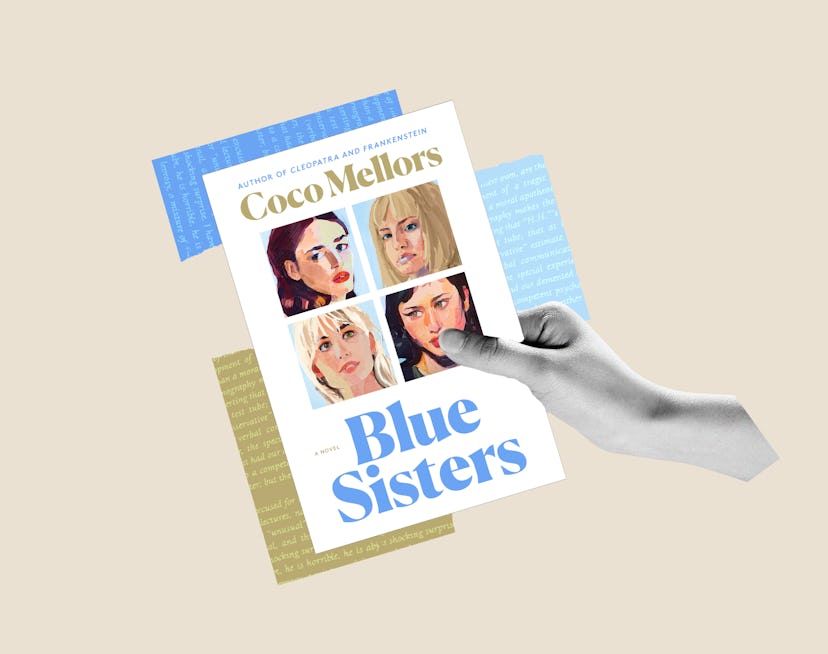Bustle Book Club
Coco Mellors Embraces The Mess
Her latest novel captures the “sticky, messy, viscous-y love” shared by sisters.

The characters that populate Coco Mellors’ novels are often arresting, rather bohemian, and incredibly charismatic. They also are typically grappling with issues related to substance abuse. Take her 2022 debut, Cleopatra and Frankenstein, which explored the way drugs and alcohol can wreak havoc on romantic relationships. Or her latest, Blue Sisters, a bracing, brutally honest novel that follows three sisters with three very different relationships to addiction. “I’m born into a family of addicts and alcoholics, and I am sober myself so that’s what I end up writing about,” Mellors tells Bustle.
Blue Sisters, recently named a Read With Jenna pick, follows Avery, who’s in recovery from heroin misuse; Bonnie, a teetotaler; and Lucky, a party girl whose lifestyle is catching up with her. When their fourth sister dies suddenly, the grief throws each of their lives off its axis, and worsens the effects of their shared disease. “Addiction looks different in different people. Even in one family it can manifest differently, but no one gets out unscathed,” Mellors says.
In addition to revisiting substance abuse, the novel probes another type of “sticky, messy, viscous-y love” — the one shared by sisters. “My sister is the one person on earth who I would die for, but I have also wanted to actually kill,” she laughs. As kids, she and her older sister would get into fights that she can only describe as “terrifying to behold”: “My sister’s ex-boyfriend once overheard our fighting and cried because it was that upsetting.”
While Mellors’ focus on such complex and heart-rending subjects could make her works melancholic, she’s a master at balancing both the glory and the pain. The times you want to scream at your sister, and the times you want to hold her for dear life. And in her third book, Mellors is exploring some of the the messily beautiful aspects of having an addictive personality. “Something I’m writing about in this book is the addict’s voracious appetite for experience and life,” she says of her work-in-progress. “And that [doesn’t go away] in recovery. It shape shifts, and reveals itself in new ways. It’s actually a very interesting part of my life.”
Below, Mellors reflects on Erewhon snacks, bathtub rituals, and Florence & The Machine.
On what she’s reading now:
Evenings and Weekends by Oisín McKenna is a really gorgeous, kaleidoscopic vision of London. One of the reasons I love it so much is that he writes from the perspective of young gay men, their female best friends (one of whom is pregnant), the mother of one of these men, and a straight man. I find it so refreshing and quite rare in fiction to have that polyphonic style of moving through perspectives that are not your own.
On the importance of treats:
When I was living in LA, I had an Erewhon nearby and I would walk there to get these “healthy” peanut butter cups that I was eating religiously every afternoon. I’m someone who has to have to sweet treat with almost every meal. I’ll have a “silly” sweet treat and a “serious” sweet treat. My silly sweet treats are like a Twix ice cream bar, whereas the peanut butter cups are a serious sweet treat because they’re an adult version.
On the music she writes to:
My Spotify Wrapped at the end of the year was so weird because it’s like Sufjan Stevens and some instrumental music — things that are tonal and emotional but not intrusive. When Florence & The Machine’s new album came out, I was in the top one percentile for listening to that album, which I think is quite impressive.
On unwinding with comfort TV:
I’ll celebrate a good day of writing by watching Sex and the City in the bath, while balancing some kind of sweet treat on the lip of the tub — like a slice of cake.
This interview has been edited and condensed for clarity.